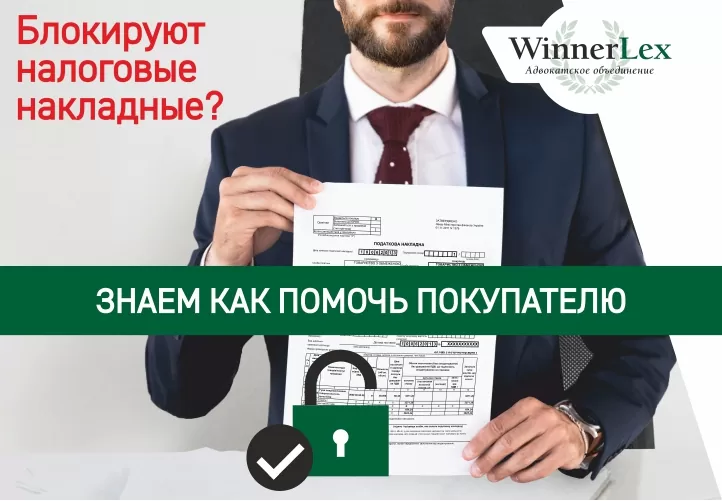Unblocking Tax Invoices: What Should the Buyer Do?
17.08.2021

Nowadays, the internet is flooded with various content mentioning the unblocking of tax invoices, as this issue arises periodically in almost every business. However, most articles provide information and recommend actions only for the Seller of goods. This uniformity is justified by the fact that the tax authorities block invoices and refuse to register tax invoices (TIs) directly for the Seller, not the Buyer of the goods. Moreover, under current legislation, only the Seller has the right to unblock a tax invoice in a pre-trial procedure, initiate a tax dispute, and appeal the refusal of registration in court.
The Blocking of Tax Invoices Threatens Losses for the Buyer, Not the Seller
As a result of TI blocking, the Buyer loses the ability to reduce their own tax liability by the amount of VAT already paid when purchasing the goods. Consequently, when reselling the goods, the Buyer is forced to pay VAT in full, rather than only on the added value.
What Should Be Done When a Tax Invoice Is Blocked, and How Can the Buyer Prevent Losses Related to TI Blocking?
Let’s consider the most common questions Buyers ask when they seek legal tax consultation regarding the unblocking of tax invoices.
1. Can the Buyer Independently Unblock an Invoice Blocked by the Tax Authorities?
Unfortunately, tax legislation does not allow the Buyer to independently prove the illegality of TI blocking or to challenge the decision of the State Tax Service commission in either administrative or judicial proceedings. Only the Seller of the goods has the right to:
— Provide explanations in case of invoice blocking;
— Appeal the refusal of TI registration;
— Initiate tax dispute resolution in court.
Thus, the Buyer’s ability to resolve the issue of TI blocking entirely depends on the activity and competence of the Seller’s actions aimed at unblocking tax invoices.
2. Can the Buyer Force the Seller to Register a Tax Invoice Through the Court?
The Buyer should not file a lawsuit against the Seller to expedite their actions in unblocking a tax invoice (TI), as the court will likely deny such a claim. The legal position of the Supreme Court on this matter is outlined in the ruling on case No. 908/1568/18 dated June 5, 2019. The ruling states that demands for the Seller to register a TI are not subject to judicial review.
3. How Can the Buyer Protect Their Rights in Court in the Event of Tax Invoice Blocking?
In case No. 917/877/17, the United Chamber of the Commercial Cassation Court within the Supreme Court ruled that:
“There is a direct causal link between the Defendant’s inaction in fulfilling the legally prescribed procedure for tax invoice registration and the inability of the Plaintiff to include the VAT amount in their tax credit. Consequently, this results in a reduction of tax obligations by the specified amount, which effectively constitutes a loss for the Plaintiff.”
It is important to note that this judicial practice applies specifically to situations where the Seller has taken no action whatsoever to register tax invoices. However, in our view, this approach can also be applied in cases where the Buyer seeks to recover losses from the Seller due to the blocking of tax invoices.
Therefore, if the Seller is unwilling to unblock tax invoices, the Buyer may file a lawsuit in the commercial court to claim compensation for the damages incurred.
4. Can the Buyer Protect Themselves from the Negative Consequences of Tax Invoice Blocking?
The Buyer can mitigate the risk of losses due to tax invoice (TI) blocking by contractually regulating the payment process for purchased goods or services. To do this, the contract should include a provision granting the Buyer the right to transfer 20% of the total cost of goods, work, or services to the Seller only after the Seller successfully registers the tax invoice.
In the event of TI blocking, the Buyer would then have the right to withhold the remaining 20% of the contractual amount, which corresponds to the value of the VAT tax credit. This way, the Seller’s incentive to receive full payment will serve as a strong motivation to take the necessary steps to unblock the tax invoice.
Conclusion
Tax invoice blocking is not a dead end for either Sellers or Buyers of goods and services. However, resolving this issue requires prompt and professional action.
The tax attorneys at WinnerLex have over 15 years of experience in tax and litigation practice. We provide expert assistance in tax invoice unblocking and resolving various tax disputes. Additionally, we offer support during tax audits, which are becoming increasingly frequent.
